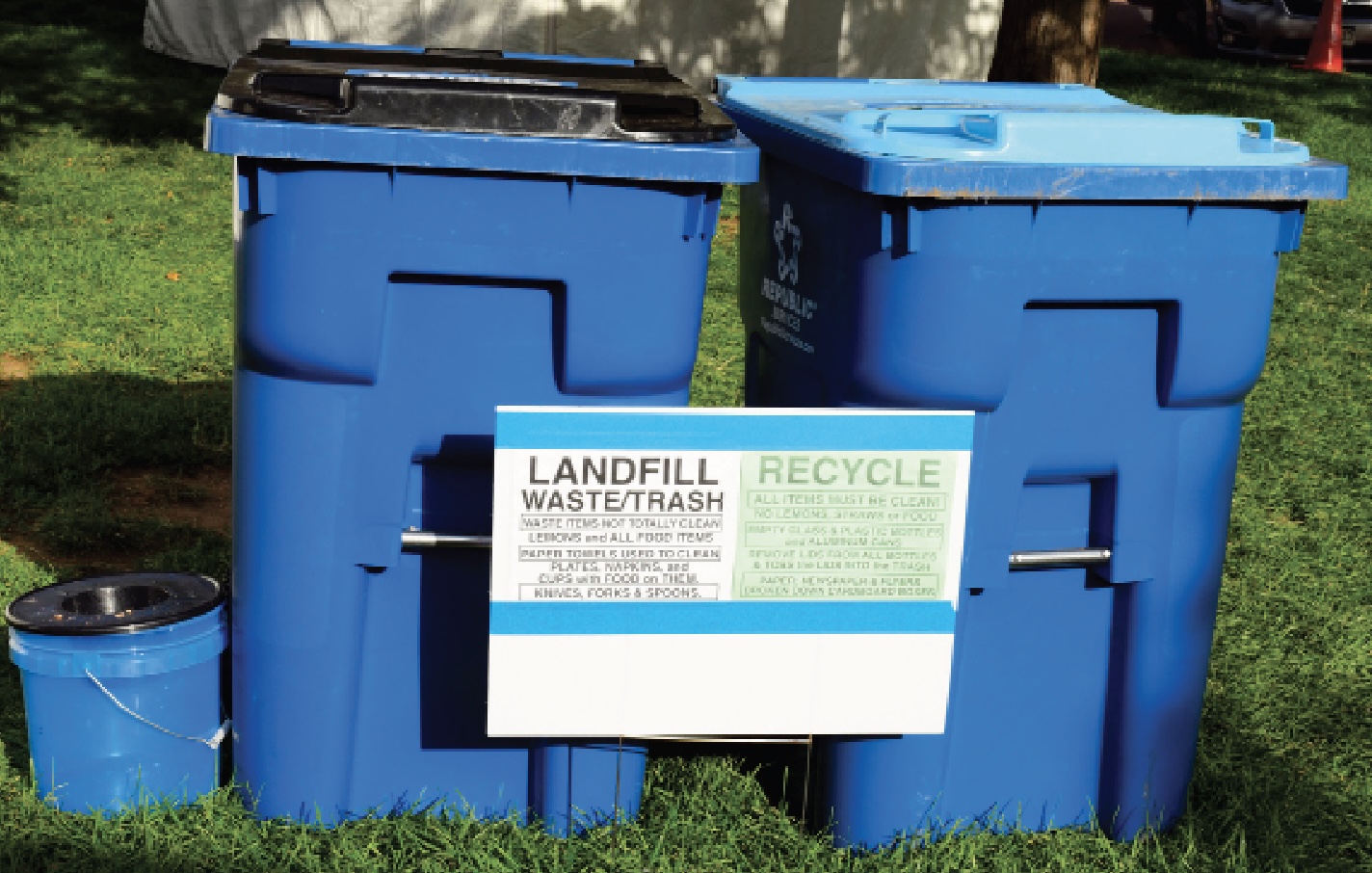Manitou Springs is renowned for its fun major festivals that draw people from around Colorado and beyond. But when those people leave town, they can leave behind a mess.
The organizers of events such as the Commonwheel Labor Day Arts Festival and the Manitou Springs Colorado Wine Festival are working hard and being thoughtful about how to reduce waste in Manitou’s parks and streets.
Julia Wright has led the organizing duties for most of Commonwheel Artist Co-op’s Labor Day festivals, now in their 50th year.
The festival crew began collecting recyclables and compostables in 2009, although Wright admits that the bins were not very effective. But Bestway Recycling was a sponsor for five years and the bins — and their usage — improved.
Republic Services waste disposal now contracts for the bins and their removal.
“It has been very important to me, and other members of the Commonwheel Festival committee, that we do this. It costs quite a bit more to have a waste-handling company supply items to help collect recyclable or compostable items and to dispose of them properly,” Wright said.
Fortunately, the festival has “green” fiscal sponsors that cover the additional costs.
Volunteers are a huge help, too. Kiera Lynn, local singer/musician/writer, is in charge of rounding up festival helpers and oversees the collecting on festival weekend.
“We usually have two people all the time that the festival is open who make the rounds every half hour and sort each of the bins, and then move the ones that were getting full to the final collection area. At the end of the day, volunteers round up all the bins and do a final sorting,” Wright explained.
She fondly remembers a previous festival volunteer who noticed several bags of trash in a large recycling bin. He found a ladder and climbed in to pull out the “bad bags.”
“It deeply mattered to him that that bin did not get contaminated and oversaw it each night and morning,” she said.
Some volunteers have pitched in for at least five years, she added.
Wright emphasized the importance of training volunteers; among other duties, they need to carefully inspect smaller collection bins to ensure that the items inside are clean and truly recyclable before they’re dumped into the larger bin.

“We live on a planet that has limited resources, and we all need to take steps to protect it,” Wright said.
Visit Manitou Springs (formerly the Chamber of Commerce) staffers encourage recycling at its events.
Volunteers are recruited to assist, and VMS partners with local compost and recycling service providers. Most food and drink vendors at the events readily opt for compostable utensils and containers, and Styrofoam containers are not allowed.
“I would venture to say our requests for plastic reduction are well-received as we strive to be closer to zero-waste events,” said Jenna Gallas, special events coordinator.
But, she cautions, “There is still much work to do, especially in terms of attendees having an understanding of which kind of waste goes where.”
Clear signage in front of bins and on the lids helps, yet some people still don’t pay attention, Wright said.
VMS staffers are working to increase the educational components at events and to guide attendees about where they can deposit recyclables and compostables. And they want to limit contamination of containers.
They’re also working to find an accurate way to measure what they’ve diverted. Wright said that, when Bestway handled festival waste, the company weighed everything.
“Our best year, when we were doing composting and recycling bins, we had 80 percent of the waste created at the festival diverted from the landfills. During those years, we averaged having around 60 percent diverted from the landfills,” she said.
Last year’s recycling efforts diverted 50 percent of its waste from landfills, Wright reported.
Both Gallas and Wright feel that the extra time and expense is worth it.
“Our community watershed is a resource that we strive to protect. To set an example for other local event producers and show leadership in sustainability efforts within our community is important to us,” Gallas said.
To her and her colleagues, any small step taken toward zero waste can be celebrated as a success.
Wright has noticed that, every year, more people become aware of how important it is to recycle. She’s heard people say they’d sign up for recycling with their waste-collection contractor after seeing how easy it is to do.
As she points out, recycling itself creates jobs.
“It takes less water and energy to create aluminum cans from recycled items than new aluminum from bauxite ore. Items that get recycled don’t go to a landfill, and that saves a bit of space and creates less methane gas,” Wright said.
Visit Manitou Springs partners with Food to Power (foodtopowerco.org) for composting. A Denver company, Clear Intentions, had been handling empty bottles from the wine festival, but the company didn’t survive the pandemic.
VMS is working with Galvanize Recycling to find alternatives for this year’s events, and hopes to be part of the Manitou Cares effort at the Manitou Art Center.
For at least five years, VMS has had a recycling dumpster outside its 354 Manitou Ave. office building.
“Helping businesses with a way to recycle when they were out of room, or didn’t have other options, seemed like a great idea and it was a small price to pay,” Executive Director Leslie Lewis said.
It’s also available to residents and visitors who stop in looking for a recycling location, she said.
“Certainly, these efforts take time, partnerships and planning. There will be additional costs that tag along that may be unexpected, but the reward is greater, knowing that sustainability efforts made are beneficial well beyond our watershed, habitat and community,” Gallas said.

